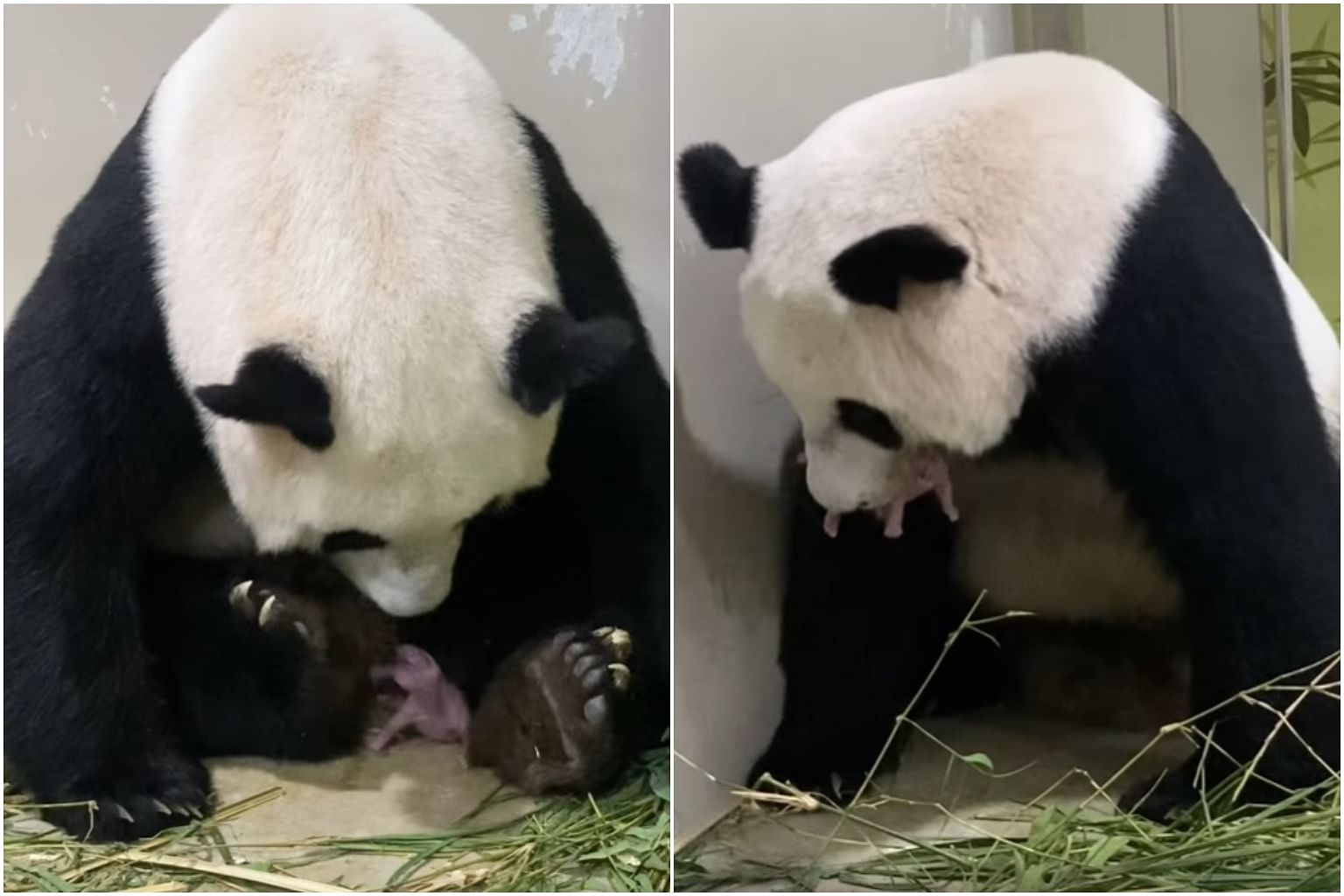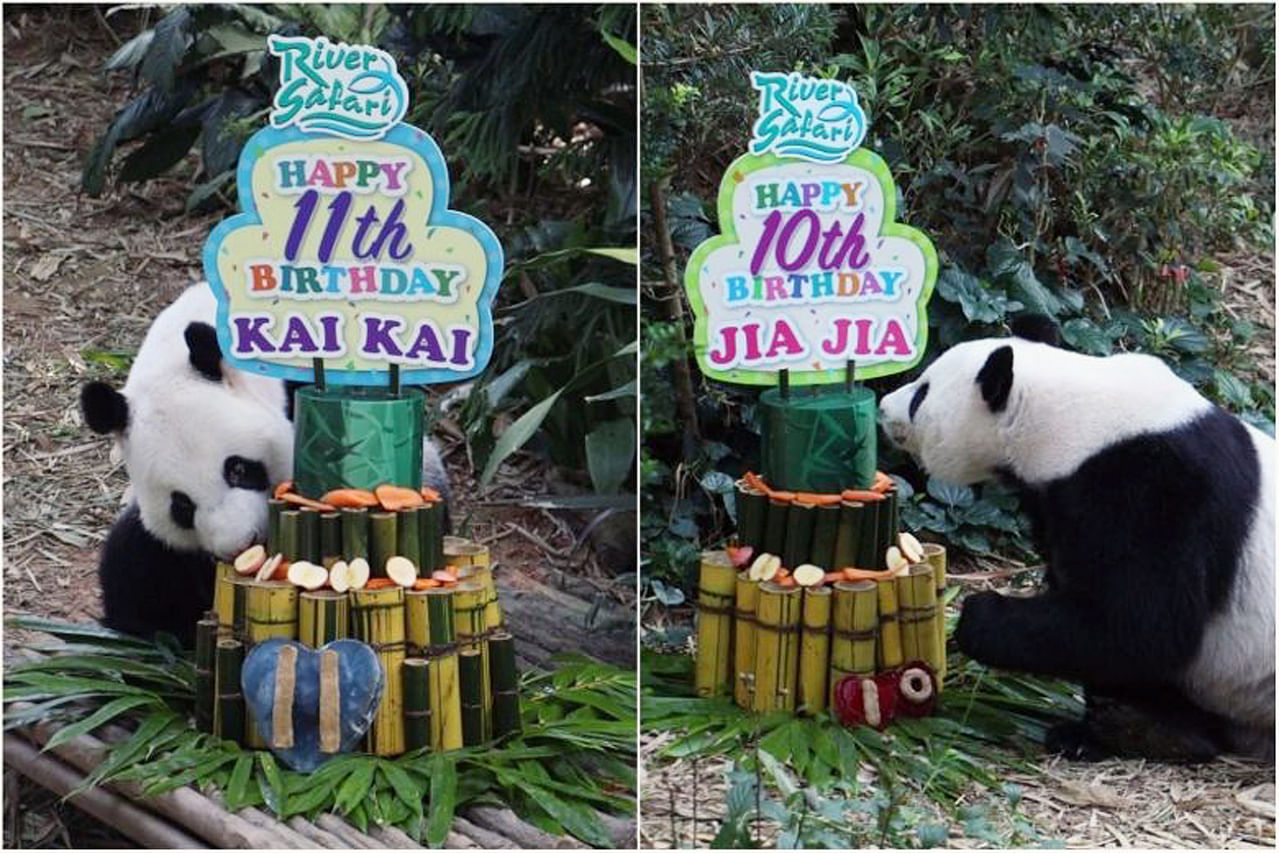Singapore gets first panda cub, born to Kai Kai and Jia Jia at River Safari
Sign up now: Get ST's newsletters delivered to your inbox
SINGAPORE - The nation's first panda cub was born on Saturday (Aug 14) at the River Safari at about 7.50am, to parents Kai Kai and Jia Jia.
In a statement on Sunday, Wildlife Reserves Singapore (WRS), which operates the River Safari, called the birth "a joyful boost to the ongoing National Day celebrations this year".
It added that the panda cub's gender is yet to be determined and will be announced later.
Mother Jia Jia and her cub, which weighs about 200g, are in an off-exhibit den to give them time to nurse and bond, WRS said.
WRS told The Straits Times on Sunday evening that the public will be able to see Jia Jia and the cub in their exhibit in approximately three months.
"We will post regular updates with videos and photos of Jia Jia and her cub on our social media platforms so everyone can keep abreast of their development," it said.
WRS added that more updates will be announced in the coming weeks, including a the cub's name which it called "another important milestone ahead".
The successful birth comes after the giant pandas' seventh breeding season. They began mating in 2015.
WRS told The Straits Times on Sunday evening that the public will be able to see Jia Jia and the cub in their exhibit in approximately three months.
"We will post regular updates with videos and photos of Jia Jia and her cub on our social media platforms so everyone can keep abreast of their development," it said.
WRS added that more updates will be announced in the coming weeks, including a the cub's name which it called "another important milestone ahead".
The successful birth comes after the giant pandas' seventh breeding season. They began mating in 2015.
Giant pandas are notoriously difficult to breed in captivity, in part due to the narrow window for conception. Females like Jia Jia ovulate only once a year, and her fertility also peaks for just 24 to 36 hours.
WRS said 13-year-old Kai Kai and 12-year-old Jia Jia displayed signs of being in heat in April this year.
It added that its animal care team was optimistic that the pandas would naturally breed this year, as the pair had shown improvements in their mating techniques the year before.
However, the keepers did not observe clear signs of successful mounting.
However, the keepers did not observe clear signs of successful mounting.
Experts from the China Conservation and Research Centre for Giant Panda advised WRS vets to perform artificial insemination before the end of Jia Jia's receptive period, to make the most of the once-a-year breeding season.
Dr Cheng Wen-Haur, WRS' deputy chief executive and chief life sciences officer, said ultrasound scans done in July showed a thickening of Jia Jia's cervix and some fluid in the uterine horns.
"We stayed hopeful for Jia Jia, while maintaining her ultrasound checks to monitor developments," he added, noting that female giant pandas can experience pseudopregnancy - where they show hormonal and behavioural signs of pregnancy even when they are not expecting.
"We stayed hopeful for Jia Jia, while maintaining her ultrasound checks to monitor developments," he added, noting that female giant pandas can experience pseudopregnancy - where they show hormonal and behavioural signs of pregnancy even when they are not expecting.
Dr Cheng said the only sure way to confirm a pregnancy is through seeing a foetus that is near to term.
The gestation period ranges from three to more than five months.
On Aug 10, a WRS vet saw a clear outline of a foetus with a strong heartbeat during an ultrasound scan.
"Jia Jia's first pregnancy and birth of a cub is a significant milestone for us in the care of this threatened species in Singapore," said Dr Cheng. "The work continues now with supporting the first-time mother to raise her newborn cub."
"Jia Jia's first pregnancy and birth of a cub is a significant milestone for us in the care of this threatened species in Singapore," said Dr Cheng. "The work continues now with supporting the first-time mother to raise her newborn cub."

WRS said that outside of China, giant panda breeding is quite sporadic.
"Some countries are still to achieve successful breeding despite many years of attempts," it added.
"For those that have been successful, not many have been able to repeat the success on a regular basis."
Kai Kai and Jia Jia arrived in Singapore in September 2012, on a decade-long loan from China.
"Some countries are still to achieve successful breeding despite many years of attempts," it added.
"For those that have been successful, not many have been able to repeat the success on a regular basis."
Kai Kai and Jia Jia arrived in Singapore in September 2012, on a decade-long loan from China.
Sponsored by real estate company CapitaLand, they are one of the River Safari's main attractions.
Under the agreement, the baby panda will return to China when it turns two, said Senior Parliamentary Secretary for Transport Baey Yam Keng in a comment on his Facebook post about the birth.

<p>River Safari’s famous panda couple, Kai Kai turned 11 on September 14, while Jia Jia's 10th birthday fell on September 3. Each panda received a 1.2m-tall tower adorned with apples and carrots, and containing about 17kg of bamboo. </p>
PHOTO: WILDLIFE RESERVES SINGAPORE
Asked about the panda family's future, given the newborn cub, WRS said that details will be announced in due course.
Prime Minister Lee Hsien Loong said he was delighted by the birth of the panda cub, and congratulated the WRS team.
Prime Minister Lee Hsien Loong said he was delighted by the birth of the panda cub, and congratulated the WRS team.
He wrote on Facebook: "It is famously difficult for pandas in captivity to reproduce. Pandas have only a narrow window each year to conceive.
"This is the seventh attempt for Kai Kai and Jia Jia. Their keepers deserve kudos for this difficult and rare accomplishment, and for persevering despite previous failures."


